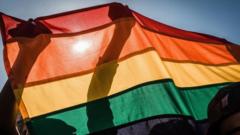The World Bank's decision marks a pivotal moment in its relationship with Uganda, a country heavily reliant on external financing for development projects. The institution had suspended loans following Uganda’s adoption of its Anti-Homosexuality Act, which instituted severe penalties for same-sex relationships, including death sentences for certain acts. Human rights organizations have reported a harsh crackdown on LGBTQ individuals, leading to fears and oppression among the community.
Despite the ban, the World Bank stated that it has developed “mitigation measures” aimed at ensuring that ongoing and future funding will not adversely affect LGBTQ individuals. A spokesperson emphasized that the bank’s mission—to alleviate poverty—hinges on the inclusivity of all people in funded initiatives.
Approved projects will focus on key sectors like education, social protection, and assistance for displaced individuals, aiming to foster overall development while adhering to anti-discrimination protocols. Analysts note that the World Bank plays a crucial role in Uganda’s infrastructure, supporting projects in energy and transportation.
Nevertheless, criticism surrounds the World Bank’s funding model, which some economists argue perpetuates dependency on international aid while stifling sustainable growth in poorer nations. Critics also point to the consequences of Uganda’s Anti-Homosexuality Act, which resulted in economic losses ranging from $470 million to $1.7 billion due to halted international financing.
The Ugandan government defends its controversial legislation as a reflection of the nation's cultural and moral values, whereas critics perceive it as a diversion from pressing issues such as high unemployment rates and political dissent. LGBTQ activists fear that the law has emboldened violence against them, as it criminalizes not only same-sex relationships but also advocacy for LGBTQ rights.
As Uganda continues to navigate its complex socio-political landscape, the World Bank’s renewed support opens a dialogue about balancing development assistance with respect for human rights.
---
*The content thoroughly addresses the World Bank's decision amid Uganda's anti-LGBTQ measures while explaining the ramifications for human rights and socio-economic conditions in the country.*
Despite the ban, the World Bank stated that it has developed “mitigation measures” aimed at ensuring that ongoing and future funding will not adversely affect LGBTQ individuals. A spokesperson emphasized that the bank’s mission—to alleviate poverty—hinges on the inclusivity of all people in funded initiatives.
Approved projects will focus on key sectors like education, social protection, and assistance for displaced individuals, aiming to foster overall development while adhering to anti-discrimination protocols. Analysts note that the World Bank plays a crucial role in Uganda’s infrastructure, supporting projects in energy and transportation.
Nevertheless, criticism surrounds the World Bank’s funding model, which some economists argue perpetuates dependency on international aid while stifling sustainable growth in poorer nations. Critics also point to the consequences of Uganda’s Anti-Homosexuality Act, which resulted in economic losses ranging from $470 million to $1.7 billion due to halted international financing.
The Ugandan government defends its controversial legislation as a reflection of the nation's cultural and moral values, whereas critics perceive it as a diversion from pressing issues such as high unemployment rates and political dissent. LGBTQ activists fear that the law has emboldened violence against them, as it criminalizes not only same-sex relationships but also advocacy for LGBTQ rights.
As Uganda continues to navigate its complex socio-political landscape, the World Bank’s renewed support opens a dialogue about balancing development assistance with respect for human rights.
---
*The content thoroughly addresses the World Bank's decision amid Uganda's anti-LGBTQ measures while explaining the ramifications for human rights and socio-economic conditions in the country.*


















